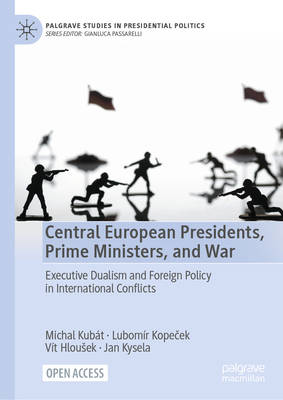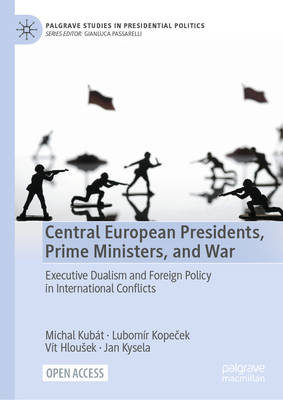
- Afhalen na 1 uur in een winkel met voorraad
- Gratis thuislevering in België vanaf € 30
- Ruim aanbod met 7 miljoen producten
- Afhalen na 1 uur in een winkel met voorraad
- Gratis thuislevering in België vanaf € 30
- Ruim aanbod met 7 miljoen producten
Zoeken
Central European Presidents, Prime Ministers, and War
Executive Dualism and Foreign Policy in International Conflicts
Michal Kubát, Lubomír Kopeček, Vít Hlousek, Jan Kysela
€ 53,45
+ 106 punten
Omschrijving
This open access book provides an in-depth exploration of how presidents, prime ministers, and their cabinets manage relationships and make decisions in times of international crises. The authors focus particularly on war and its effect on executive dualism and presidential activism. This systematic analysis concentrates on four Central European countries - Poland, Czechia, Hungary, and Slovakia - and examines the ongoing Russian-Ukrainian war, as well as earlier conflicts: the Kosovo crisis (1999), the Iraq War (2003), the Russo-Georgian War (2008), and Russia's annexation of Crimea and the emergence of separatist "republics" in eastern Ukraine (2014). All these conflicts had a major political impact on the political landscape of Central Europe, often empowering presidents, who represent the state externally and influence foreign and security policies.
Specificaties
Betrokkenen
- Auteur(s):
- Uitgeverij:
Inhoud
- Aantal bladzijden:
- 198
- Taal:
- Engels
- Reeks:
Eigenschappen
- Productcode (EAN):
- 9783032049049
- Verschijningsdatum:
- 5/12/2025
- Uitvoering:
- Hardcover
- Formaat:
- Genaaid
- Afmetingen:
- 148 mm x 210 mm
- Gewicht:
- 380 g

Alleen bij Standaard Boekhandel
+ 106 punten op je klantenkaart van Standaard Boekhandel
Beoordelingen
We publiceren alleen reviews die voldoen aan de voorwaarden voor reviews. Bekijk onze voorwaarden voor reviews.








